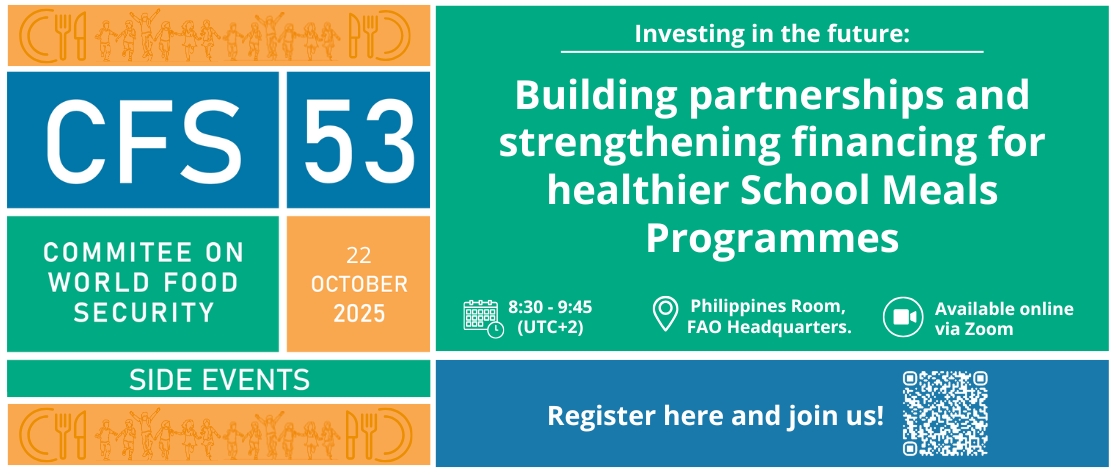Committee on World Food Security
Metropolitan City of Rome Capital (Italy), Hybrid Event, 22/10/2025

Background
School Meals Programmes are key strategies to address food insecurity and malnutrition, especially among school-age children and adolescents. Despite global investments of nearly USD 50 billion, challenges persist.
Recent estimates from SOFI 2025 show global hunger declined from 8.5% in 2023 to 8.2% in 2024, mainly due to progress in Asia and South America, while it continues to rise in Africa and Western Asia. Food insecurity also decreased gradually, reaching 28% of the global population in 2024, while the cost of a healthy diet rose by 3.7% in 2024, reaching 4.46 PPP dollars per person per day.
Despite this increase, the number of people unable to afford such a diet dropped to 2.6 billion. Obesity continues to rise worldwide, affecting 15.8% of adults in 2022, up from 12.1% in 2012. Child overweight remained stable globally at 5.5% in 2024, with LAC showing the highest levels and increases in both indicators.
Sustainable financing, knowledge, and locally engaged partnerships are essential to ensure quality, inclusion, equity, and long-term impact. For instance, the Sustainable School Feeding Network (RAES), led by Brazil-FAO cooperation, supports 18 LAC countries to enhance their SFP through dialogue, policy development, nutrition standards and public procurement from family farming. While financing is one key component, knowledge and understanding of the enabling environment, nutrition, local food preferences and local partnership are also pivotal for scaling up the programmes.
The School Meals Coalition, with over 100 members, fosters global collaboration to ensure every child receives a healthy school meal by 2030. Its Sustainable Financing Initiative builds evidence and provides technical assistance to boost domestic investment.
Join us online Wednesday 22 October 2025 at 08:30 (UTC+2) for this event aimed at sharing best practices with regards to financing and collaboration as well as discussing enabling environments with a child-centered approach. The dialogue will highlight how school meals can become a driver of agrifood resilience, and access to affordable healthy diets.
Register and join us online here
For more information, visit the Side Events section of the 53 Session Committee on World Food Security.
Documents
Coming soon
Contact
Communicator for the Regional Better Nutrition Priority
FAO Regional Office for Latin America and the Caribbean

